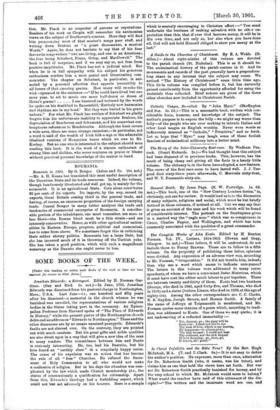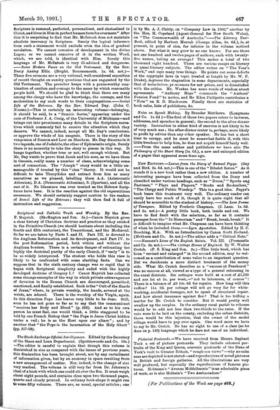Is Vhrist Infallible and the Bible True? By the Rev.
Hugh McIntosh, M.A. (T. and P. Clark. 9s.)—It is not easy to define the author's position. He expresses, more than once, admiration for Dr. Robertson Smith (who, it seems, was his tutor), and claims him as one that held the views here set forth. But was not Dr. Robertson Smith practically banished for heresy, and by the very school to which Mr. McIntosh would seem to belong ? What would the teacher have said of this utterance of the dis- ciple ?—" The written and the incarnate word are one, and Scripture is summed, perfected, personalised, and clericalised in Christ, and lives in Him in perfect human form for evermore." After this it is surprising to find that Mr. McIntosh does not maintain absolute inerrancy in Scripture. Surely the logical inference from such a statement would exclude even the idea of gradual revelation. We cannot conceive of development in the divine Logos; so we cannot conceive of it in the written Word, which, we are told, is identical with Him. Surely this language of Mr. McIntosh is very ill-advised and dangerous. —Some Modern Vsews on the Old Testament. By the Rev. Percy Ansley Ellis. (Bright, Bournemouth. le. 6d. net.)— These five sermons are a very rational, well-considered exposition of recent thought on sundry questions that are suggested by the Old Testament. The preacher keeps with a praiseworthy com- bination of caution and courage to the mean by which reasonable people hold. We should be glad to think that there are many among the clergy who have the knowledge, the courage, and the moderation to say such words to their congregations.—Social Life of the Hebrews. By the Rev. Edward Day. (John C. Nimmo.)—This is certainly an ieteresting volume—belonging, it should be said, to a "Semitic Series," appearing under the care of Professor J. A. Craig, of the University of Michigan—and brings out into prominence many details in the Scripture narra- tives which commonly fail to receive the attention which they deserve. We cannot, indeed, accept all Mr. Day's conclusions, or approve the whole of his exegesis. There is the story of the vengeance of Simeon and Levi on Shechem. Mr. Day discerns in it two legends, one of judahite, the other of Ephraimite origin. Surely there is no necessity to take the story to pieces in this way. It bangs together, whether true or not, well enough without. But Mr, Day wants to prove that Jacob and his sons, as we have them in Genesis, really mean a number of clans, acknowledging some sort of connection. The "Joseph" story would be a little un- manageable if treated by this "clan" theory. It would not be difficult to take Thucydides and extract from him as many narratives as we pleased, labelling them A.A. (Aristocratic Athenian), D.A. (Democratic Athenian), S. (Spartan), and all the rest of it. No literature was ever treated as the Hebrew Scrip- tures have been. It is the reaction against the old superstitious reverence. We should certainly suggest caution to the readers of Social Life of the Hebrews ; they will then find it full of instruction and suggestion.







































 Previous page
Previous page